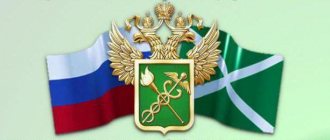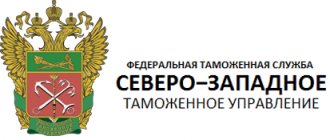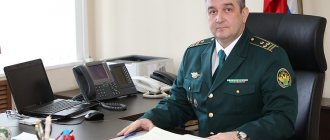Moscow is trying to solve the problem of traffic jams. Interview with Sergei Prusov
The Moscow government is trying to solve the problem of traffic jams.
One of the solutions is to withdraw all customs points from the capital. Will this help relieve congestion in the city? The question is ambiguous. Elena Shchedrunova talked about this with the head of the Central Customs Administration, Sergei Prusov, in the Vesti FM radio studio. Shchedrunova: Hello. At the microphone is Elena Shchedrunova. In order to figure out how many customs points there are in Moscow, what kind of transport load they put on the city and whether they can be removed completely painlessly from the capital, we will try to find out today with the help of our guest. This is the head of the Central Customs Administration, Sergei Prusov. Sergey Nikolaevich, hello.
Prusov: Hello.
Shchedrunova: To begin with, how many customs points are there in the capital within the Moscow Ring Road?
Prusov: Well, let's start with history. Indeed, customs and customs clearance points exist in Moscow today. There are not many of them, only five.
Shchedrunova: Exactly five customs points?
Prusov: Exactly five customs points. They, so to speak, wear a certain specialized color. These are a diplomatic post, a railway post, an exhibition post, and an International Post Office. If you look at how many consignments of vehicles enter the city of Moscow every day under customs control, the numbers, in general, are incomparably small, one might say, scanty: 20 vehicles arrive at the International Post Office, 20 vehicles in total, and 10 vehicles at the International Post Office. If 2 million vehicles are in the capital every day, then 30 cars are probably incomparably small.
Shchedrunova: But it depends on how they drive, in what mode. And if they are concentrated in one place and they are huge, they can actually create enormous problems for transport.
Prusov: I don’t think so. 10 years ago, 8 years ago, there were still four customs houses in Moscow, there were about 50 customs clearance places, 352 temporary storage warehouses. And two years ago, we carried out organizational measures to transfer customs clearance from the city of Moscow to the nearby Moscow region and to the border. We are implementing the so-called concept of moving customs clearance points from large cities and transferring clearance to the border. This concept has been agreed upon with the government of the Russian Federation and is of a planned nature. And the events that the Moscow city government now wants to carry out are the right ones. And we, in turn, dealt with this issue two years ago. That is, we have already prepared some ground for creating favorable conditions and unloading transport arteries.
Shchedrunova: But, nevertheless, for example, the same trucks that come to Avtoframos, do they immediately enter the territory of the plant and stay there? Or are they standing in the adjacent streets, waiting for their registration?
Prusov: No, there is enough space at Avtoframos to place them on the territory of the plant.
Shchedrunova: That is, this is already a terminal that receives...
Prusov: Yes, absolutely right.
Shchedrunova: Is the International Post Office the same story? Or are these on the street?
Prusov: No, they also have their own areas. These 10 cars are nothing for Moscow, in general.
Shchedrunova: I repeat once again, depending on how they are located. If they are concentrated simultaneously in one place, this can be a big problem.
Prusov: No, we analyzed this situation, we looked. The 10 cars that arrive at the International Post Office do not interfere with traffic in the city itself.
Shchedrunova: But, nevertheless, there is a proposal not to allow trucks and heavy vehicles into the city during the daytime. Only at night.
Prusov: Yes, I heard about it.
Shchedrunova: Are customs services ready to accept the same trucks, I don’t know, to clear the cargo or simply then place these trucks on the territory of customs points at night? That is, rearrange your work schedule.
Prusov: I think that we can resolve this issue, yes. These 30 cars arriving in Moscow will not affect the quality of customs clearance.
Listen to the interview with Sergei Prusov in audio files
Listen to interviews on other current topics on the Vesti FM radio website
S. Prusov will not become the head of North-West Technical University?
Those interested in the biography of the official will find early mentions of S. Prusov on the website www.compromat.ru in the article “Odintsovo organized crime group”. It provides facts of corruption between the criminal group and the Odintsovo district police department. Among other things, it is mentioned that the head of the investigative department of the Odintsovo police department, police captain S.N. Prusov. received land plots in Barvikha.
Indeed, Sergei Nikolaevich Prusov once worked in the police, where he acquired profitable and useful connections, but the main and main connection is a family connection with the head of the Federal Customs Service of Russia, Andrei Yuryevich Belyaninov. Sergei Nikolaevich is a “brother-in-law” to Andrei Yuryevich, since they are married to sisters. Actually, this explains his “success” and “insight” in the customs service. The saying goes: “Two brothers make a bear, and two brothers-in-law make a jelly.” This expression shows that brothers-in-law are reliable, which is confirmed by Sergei Nikolaevich’s career in the customs service, which has developed very successfully under the current leader. (Between the lines, we note that family relationships also helped A. Strukov, who at the age of 36 took a lieutenant general position in the structure of the Federal Customs Service).
A year after the appointment of A. Belyaninov as head of the Federal Customs Service, S. Prusov was appointed first deputy head of the Central Technical Service, and a little later - chief. The former policeman understood the main tasks in a unique way - regulating the flow of goods in the region where the CTU operates and determining customs clearance places for “loyal” organizations, as well as the development of budget funds. For the latter purpose, V. Zhovtobelly, deputy for the rear, was appointed.
The next career step was to be the position of deputy head of the service. In the media you can find references to how A. Belyaninov personally expressed to the Russian Cabinet of Ministers his interest in having Sergei Prusov appointed as his deputy, but the government did not support this proposal.
One can speculate about the reasons for the refusal. However, it so happened that this decision coincided with the recent corruption scandal at the CTU. In March, Valery Zhovtobryukh was arrested. He became the third person involved in the case of attempted bribery by high-ranking employees of the Central Customs Administration to the auditor of the Accounts Chamber. Earlier, two more subordinates of Sergei Prusov were detained - the deputy head of the logistics service of the Central Technical Directorate, Sergei Vostrikov, and the head of the financial and accounting service of the same department, Svetlana Ignatova. According to investigators, during an audit by the Accounts Chamber, numerous violations of the law were revealed in the department during the implementation of government contracts, after which officials decided to bribe the inspector. Sergei Vostrikov handed over 3 million rubles to a representative of the Accounts Chamber, and this fact was recorded by FSB officers.
Somewhat earlier before these events, another corruption incident came to the attention of the security forces, connected with the now former head of OKiPSUR TsTU Markov, however, it was not particularly advertised in the media. One of the consequences of this episode was the dismissal of the head of the Central Transport Control Center and V. Samsonov, also a man from S. Prusov’s team.
Rotation to an equivalent position in NWTU, according to experts, could affect the existing distribution of goods flows in the region, in particular, those passing through the Baltic customs. The unofficial “curator” of the northwestern direction is the well-known B. Shkurkin, head of the Department of Risks and Operational Control of the Federal Customs Service, who has been under the paternal tutelage of A. Belyaninov for many years and has managed to build his own informal chain of command in the regions. But, despite the warm relations between the head of the Federal Customs Service and both persons, there are no manifestations of friendly feelings between the two of them. There are many reasons for this, but we won’t go into them. But we admit that this factor could have become the main root cause of the already failed appointment: the system of checks and balances, as we know, has always been an effective management tool. However, the number did not go through.
After yet another refusal, the most likely outcome for Sergei Nikolaevich may be the non-binding position of Advisor to the Director, which was recently held by B. Shkurkin. The presence of a criminal case against the deputy is the official reason for the refusal, but, most likely, the local power elite does not like an alien Varangian who could bring chaos to the established status quo. And here another Latin phrase is appropriate: cui prodest? In this regard, we note that the most likely candidate for the vacancy is now the current head of the Baltic customs A. Chebaev, who urgently visited the main office of the FCS last week. It’s funny that on the same day B. Shkurkin unexpectedly canceled his planned trip to the Far East, sending his deputy and part-time close friend A. Egorov in his place. This is Santa Barbara, friends...
PROVED help:
Prusov Sergey Nikolaevich – Candidate of Legal Sciences, Major General of the Customs Service.
Born in 1961 in the Moscow region. He graduated from the Volgograd Higher Investigation School of the USSR Ministry of Internal Affairs in 1988. He worked as an investigator, headed the investigation department and the investigation department at the Odintsovo police department of the Moscow region. There was a deputy. Head of the Main Investigation Department, Head of the investigative unit of the Main Investigation Department at the Main Internal Affairs Directorate of the Moscow Region. Held the post of deputy. Head of the regional department of the Russian Federal Service for Drug Control. In 2007, he was appointed first deputy. Head of the Central Customs Administration for Customs Control. Since 2008, Sergey Prusov has headed the Central Customs Administration of the Federal Customs Service.
The first deputy head of St. Petersburg customs Kachanov wrote to Putin about problems in the Federal Customs Service
President of the Russian Federation V.V. To Putin from the First Deputy Head of the St. Petersburg Customs, Colonel of the Customs Service I.I. Kochanova I am currently still the first deputy head of the St. Petersburg customs. My service contract expires on July 4 due to reaching the age limit (55 years). The head of customs, on the instructions of the head of the North-West Customs Administration A.V. Povod, decided to send documents to the Federal Customs Service of Russia not to extend my period of service beyond the age limit. The formal reason is that I have 2 penalties received in 2021 and internal audits are still being carried out against me, although until the end of 2021 my service was characterized exclusively positively and was awarded with almost all departmental awards. One can only guess what this is connected with. To bring a manager to disciplinary liability with the wording “for weakening control,” when there are more than one hundred people subordinate, is solely the will of the manager. The principle works” “Your lack of disciplinary sanctions is not your merit, but our shortcoming.” I am not asking you to decide my fate, since I myself have already decided not to continue serving in the customs authorities, but to apply all my knowledge and experience in some other area. I'm tired of solving problems that have nothing to do with the tasks of customs authorities. And there are more and more such tasks every year. It was the decision to terminate my service that prompted me to write you a letter, since I don’t have to worry about my career. Since I spent 26 years in the customs authorities, I am not indifferent to the fate of the Federal Customs Service. I would like to draw your attention to 2 moments in the life of the Federal Customs Service, which lead to serious negative consequences for the service in the near future. These are personnel policy and performance indicators of customs authorities. What it is: Personnel policy. 1. Easy parting with professional managers at various levels without understanding how and with whom to fill the resulting vacancies in most cases. Under the existing system, it takes at least a month to fill vacancies in senior positions in the customs and management nomenclature, and from 3 months to a year in the FCS nomenclature. And some vacancies are not filled and more. For example, the situation with the management of the Kingisepp customs or, for example, the non-renewal of the contract with the deputy head of the St. Petersburg customs, in charge of economic issues. The vacancy arose on March 15, and to this day even an interim vacancy has not been appointed. Or the head of OKTT St. Petersburg customs, fired on February 8. To date, no one has been appointed. All this leads to the fact that all this time the duties are forced to be performed by other officials, who, as a rule, are not always subsequently appointed to these positions and who cannot perform their immediate duties, and simply do not correspond to these positions in their business qualities. All this leads to a certain loss of controllability of certain departments and excessive workload on officials. 2. Low level of wages for the majority of customs officials who have the status of federal civil servants. This is especially acute in large capital cities. If we look up the statistics, the number of people who quit their jobs voluntarily over the past year is probably higher than those hired. This year this trend is only intensifying. This happens due to the fact that the total income of the Federal State Tax Service at customs is about 30 thousand rubles, plus bonuses. But often, due to increased demands on officials in all areas of activity, they face disciplinary sanctions or are deprived of a one-time monetary incentive. The share of such officials in some departments is about 50%. Finding a job for a higher salary with less responsibility in capital cities is not a problem for competent specialists. This is typical primarily for the created electronic declaration centers. In the Moscow region there has already been a case of mass dismissal of officials at their own request. Now, instead of paying a decent salary, the Federal Customs Service collects inspectors throughout the country and sends them on a business trip to Moscow, spending money on travel allowances and hotel payments. In the St. Petersburg customs office, the CED has 50 staff, and 38 are filled. In the summer, the staff will increase by another 34 units and there is reason to believe that there will be difficulties with staffing. The same level of wages applies to specialists in information technology services, on whose competent work the uninterrupted functioning of the entire customs service depends. And it is known that these specialists are now in demand on the labor market with salaries that are several times higher than what the customs service offers. So we have constant failures in the operation of information systems, and the majority of the computer fleet has exhausted its service life. The update is very slow. Although all this is typical for all FGS. 3. Exorbitantly bloated administrative apparatus. This primarily concerns regional customs departments. When staff reductions occur, as a rule, they reduce the staff of customs and posts, but the departments do not touch themselves. At the same time, the majority of departments do not make any decisions, being a transmission link between customs and the Federal Customs Service. Customs officers call them “peredast” behind their backs. But in order to justify their need, all sorts of reports have been invented that need to be sent there, which takes up a lot of office time. And also the need to coordinate various decisions with departments, such as appointment to certain positions, although they are included in the nomenclature of the head of customs, which leads to an increase in the timing of such appointments and other negative consequences. Performance and efficiency indicators. 1. The system of customs authorities has a system of performance and efficiency indicators that are established for regional departments and, accordingly, for all lower-level customs authorities. Failure to meet these indicators is not implied and, as a rule, leads to internal checks against heads of departments that do not meet them. The indicators are constructed in such a way that the indicator numbers grow every year. That is, the effectiveness of the control carried out should increase every year in all areas. According to the logic of those who install them, we have more and more unscrupulous participants in foreign economic activity every year. This also applies to the number of criminal and administrative cases initiated, which must necessarily be more than in the previous year. In practice, business transparency in the country is increasing every year, the tax and customs service bases are being merged and other positive changes are taking place, and the customs control itself has a preventive effect, so the composition of participants in foreign economic activity is quite stable. The transfer of customs control to the stage after the release of goods is declared. All this leads to customs officers coming up with various “non-standard solutions” to meet these indicators. All this negatively affects the prestige and authority of the customs service both among customs officers themselves and participants in foreign economic activity. If the problems listed above do not exist, then in the very near future the customs service will suffer a serious crisis, the first and serious signs of which are already visible. I see an analogy with the Armed Forces of the Russian Federation, when not so long ago the prestige of the Armed Forces and service in them fell further than ever and the state had to make serious efforts to raise the authority of the Armed Forces of the Russian Federation. I am not asking you to answer this letter to me. Please pay attention to the internal state of the customs service. For now, it is still solving the tasks facing it to ensure the economic security of the Russian Federation, but every day this will become more and more difficult. I.I. Kochanov
> Work of the Central Customs Administration (CCU)
The head of the Central Customs Administration visited Yaroslavl customs
On August 19, the head of the Central Customs Administration, Major General of the Customs Service Sergei Nikolaevich Prusov, visited Yaroslavl on a working visit. During the trip, he got acquainted with the working conditions of Yaroslavl customs officers, visited the administrative building of customs, as well as Pereslavl, Rybinsk, customs clearance and customs control department No. 3 in Tutaev, Yaroslavl customs posts. This was reported by the department of inspection and crime prevention of Yaroslavl customs.
In the administrative building of the customs, the head of the department got acquainted with the work of the functional departments, talked with the personnel about the state of affairs and the difficulties encountered in the work of the departments. S.N. Prusov familiarized himself in detail with the material and technical base of customs and customs posts, listened to reports from the customs management on the progress of fulfilling the tasks assigned to customs.
During a conversation with the management team of customs, Sergei Nikolaevich found out how the implementation of advanced forms of customs clearance is going, and what problematic issues exist today.
At the end of the working visit S.N. Prusov held a meeting with the management and heads of structural divisions of Yaroslavl customs, at which he summed up the results of his visit. In his speech, the head of the Department spoke in detail about the main tasks facing the Federal Customs Service of the Russian Federation and the Central Customs Administration. The conversation was, first of all, about the implementation of the “Concept of customs clearance and customs control of goods in places close to the state border of the Russian Federation”, about structural changes that await Yaroslavl customs and the entire Central Customs Administration. Summing up his visit, S.N. Prusov spoke positively about the work of Yaroslavl customs officers and wished them further success in protecting the economic interests of Russia.
On the same day, a meeting was held in the customs conference hall with business representatives and major participants in foreign economic activity of Yaroslavl and the Yaroslavl region. The main topic of discussion is the impact of the implementation of the Concept’s measures on the foreign economic activity of industrial enterprises in the region.
The very next day, August 20, the head of the Department will go on a visit to his colleagues in Kostroma.
General information on the central control center, management structure
customs authority corruption
The Central Customs Administration (CCU) was formed in June 2000 by joining the Western Customs Administration to the Moscow Customs Administration. The region of its activity is defined as the territory of 18 subjects of the Federation of the Central Federal District of Russia, the area of which is 650.7 thousand square meters. km, population - 37.49 million people.
The management structure includes 197 posts, united in 27 customs, of which: 5 are border, 22 are internal, including specialized ones - Central operational, excise and rear customs. In the area of activity of the department there are 370 temporary storage warehouses and 70 customs warehouses, where over 17.8 thousand participants in foreign economic activity operate. The Central Customs Administration borders on the North-Western, Southern and Volga Customs Administrations. It has a state border with Ukraine and an administrative border with the Republic of Belarus.
The department is the base for the implementation of many projects related to the further modernization of the customs service and the prospects for its development. Throughout the entire period of formation of the Russian customs system, its employees were in a constant search for optimization of customs procedures, dynamically responded to the changing socio-economic situation in the country, implemented new strategic initiatives and decisions aimed at improving administrative mechanisms and performing fiscal and law enforcement functions, and personnel policies. All positive initiatives in the system of organizing and implementing state customs control, in eradicating false declarations, introducing and mastering modern customs and information technologies, and in the fight against offenses in the customs sphere were consolidated here. The department's recent years have been very productive. Despite upward adjustments to plan targets, the department copes with them and consistently brings more than 33 percent of all customs payments to the state budget. The Central Excise, Moscow Southern, Podolsk, Belgorod and other customs houses have the highest economic indicators for the collection of customs duties within the CTC.
Currently, the Department has achieved stable indicators - about 35 million US dollars are transferred to the country’s budget per day in customs payments. The department will continue to look for reserves to increase the collection of customs duties, including in the areas of activity mentioned above. In accordance with the order of the State Customs Committee of Russia, the Central Customs Administration was recognized in 2002 as the best among the country's regional departments. Currently, the development of customs infrastructure continues, its consolidation is taking place, customs terminals equipped with modern computer technology are being created, and integrated automated customs clearance and control systems (CASTO) “AIST-RT21” are being introduced. Over the past year and a half, the number of customs posts in the Moscow region equipped with this software product has tripled. Today, 24 out of 27 customs offices operate via digital communication channels. The implementation of the complex automated system “AIST-M” has begun, adapted to the state of communication in the customs offices of the western region of the Central Customs Office. Thanks to the introduction of automated systems, it has become possible to switch to the production of the main stages of customs clearance of goods by one post employee, which significantly reduces the time required for customs procedures.
The customs authorities have also begun a phased transition to the regime of electronic declaration of goods and vehicles crossing the Russian border. Thus, since the fall of 2002, about 400 cargo customs declarations using a digital electronic signature have been issued at the Moscow Southern Customs.
Customs officers in the central region of Russia are changing their priorities - along with fiscal functions, the goal is to fully promote the development of foreign trade, which will certainly entail an increase in revenues from customs duties. The customs authorities are faced with the task, together with participants in foreign economic activity, to look for ways and methods not to complicate the procedure for economic transactions, but, on the contrary, to facilitate their simplification in every possible way. The development of partnerships with participants in foreign trade activities puts forward the task of de-bureaucratizing customs procedures on the basis of trust, mutual understanding and mutual respect. But the most important thing is that today CTU employees are preparing to work in completely different conditions and legal relations, which are enshrined in the new edition of the Labor Code of the Customs Union of the Russian Federation. During its activity, the organization has experienced more than one global reform, managed to increase the volume of its work tenfold, and created a team of professionals with a high level of education and deep knowledge. Lawyers, economists, programmers, operatives, security officials, managers - all of them, having applied many experiments in practice, managed to build a flexible, viable, diversified customs service in the Central Federal District at minimal government costs.
Services:
CENTRAL CUSTOMS ADMINISTRATION (CCU) Customs authority code: 10100000
address:
107140, Moscow, Komsomolskaya square, 1A
OGRN 1037739218758 INN 7708014500
The lawyer provides professional legal services and legal assistance, extrajudicial and judicial consideration of cases in disputes related to the violation of the rights and legitimate interests of citizens and organizations in the field of business and other economic activities:
— adjustment of customs value
— refund of customs duties
— challenging a classification decision based on HS codes
— appealing illegal actions of customs authorities related to the delay in the release of goods
— recovery of losses caused by customs authorities
— unlawful bringing to administrative liability, including under Art. Art. Code of Administrative Offenses of the Russian Federation 16.1, 16.2, 14.10 and others (illegal movement of goods, reporting of false information by the carrier and broker, non-declaration and false declaration of goods, statement of false information about goods, submission of invalid documents, non-compliance with prohibitions and restrictions, non-delivery and loss of goods, illegal use trademark and other violations)
— defense in cases of accusation and prosecution for non-payment of customs duties (Article 194 of the Criminal Code of the Russian Federation) and other crimes in the field of customs legal relations
— recovery of damage caused by illegal bringing to administrative liability and illegal actions of officials.
COURT PRACTICE WITH CUSTOMS AUTHORITIES (here)
Head of the Central Customs Administration (CTU) telephone, fax
Reception of the head of the Central Customs Administration (CTU) telephone, +7(495) 265-99-56
Assistant to the Head of the Central Customs Administration (CCU) telephone,
Central fax of the Central Customs Administration (CCU) fax,
First Deputy Head of the Central Customs Administration (CTU) telephone telephone,
Reception of the First Deputy Head of the Central Customs Administration (CTU) phone +7 (495) 263-84-28
Assistant to the First Deputy Head of the Central Customs Administration (CTU ) telephone
Deputy Head of the Central Customs Administration - Head of the Federal Customs Revenue Service TsTU telephone, +7 (499) 975-40-84
Reception of the Deputy Head of the Central Customs Administration - Head of the Federal Customs Revenue Service TsTU telephone fax
Deputy Head of the Central Customs Administration - Head of the Personnel Service of the Central Customs Department, telephone, +7 (499) 975-54-08
Reception of the Deputy Head of the Central Customs Administration - Head of the Personnel Service CTU telephone,
Deputy Head of the Central Customs Administration - Head of the Legal Service of the Central Customs Department, telephone, +7 (499) 975-44-85
Deputy Head of the Central Customs Administration - Head of Operational Customs Central Customs Office telephone +7 (499) 786-9020, +7 (499) 786-9021
Deputy Head of the Central Customs Administration - Head of the Logistics Service, Central Customs Department, phone, +7 (499) 975-48-10 phone
Reception of the Deputy Head of the Central Customs Administration - Head of the Logistics Service of the Central Customs Department phone +7 (499) 975-48-24 fax
Operational duty officer of the Central Customs Administration (CTU) telephone
Department of Consulting on Customs Legislation of the Central Customs Administration (CTU) telephone, +7 (499) 608-5361
Helpline of the Central Customs Administration (CTU) phone, +7 (499) 788-1010
Public Relations Department of the Central Customs Administration (CTU) (press service, media appeals to the Central Customs Administration) telephone, +7 (495) 276-30-70 fax
Information for passing qualification exams at the Central Customs Administration (CTU) phone +7 (495) 276-35-20,
Information on incoming documents from the Central Customs Administration (CTU) telephone, fax +
CENTRAL CUSTOMS ADMINISTRATION SERVICES:
Service for organizing customs control of the Central Customs Administration (CTU) phone +7 (495) 265-99-06, phone
Organizational and inspection service of the Central Customs Administration (CTU) phone, +7 (495) 265-99-45, phone
Federal Customs Revenue Service of the Central Customs Administration (CTU) phone, +7 (495) 263-84-91, phone
Customs Inspection Service of the Central Customs Administration (CTU) telephone, +7 (495) 263-82-01, fax
Legal service of the Central Customs Administration (CTU) phone, +7 (495) 263-84-09
Information and technical service of the Central Customs Administration (CTU) phone +7 (495) 263-35-48,,
THE EARLIER YOU SEEK A LAWYER FOR HELP, THE MORE EFFECTIVE THE DEFENSE WILL BE





